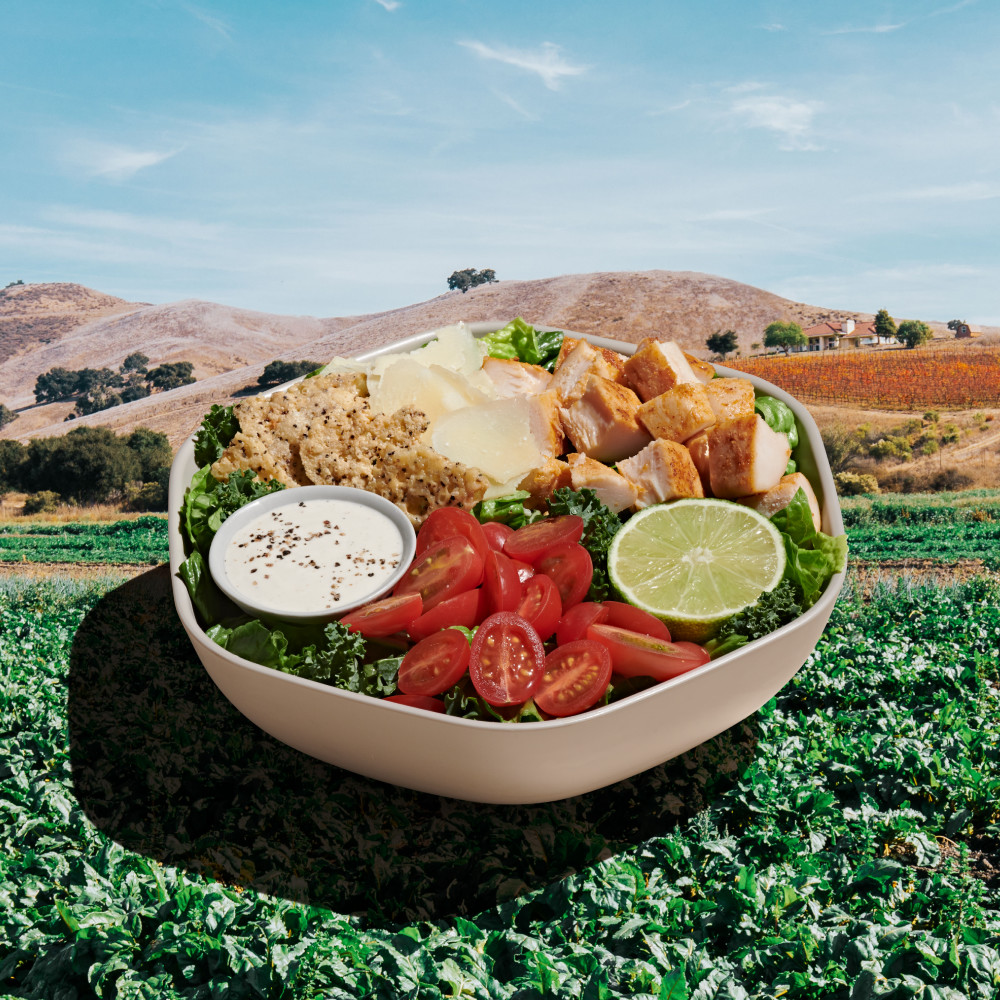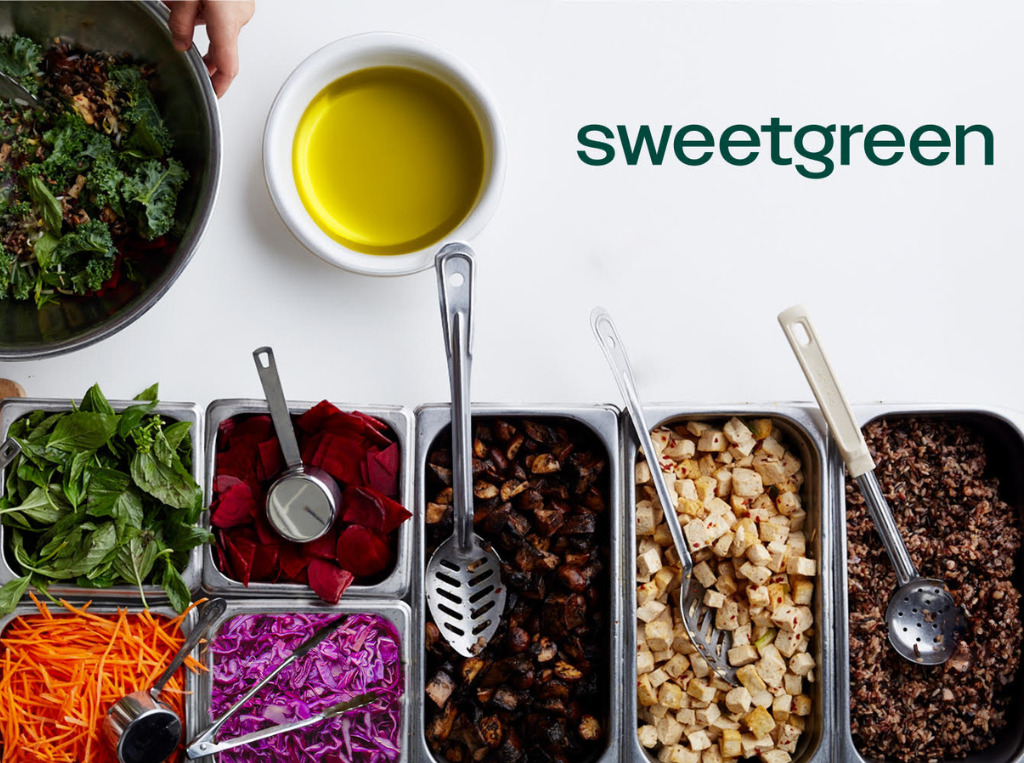Sweetgreen Will Now Only Use Extra Virgin Olive Oil to Cook Veggies, Grains & Proteins
4 Mins Read
Sweetgreen will become the first fast-casual restaurant chain in the US to exclusively use heart-healthy extra virgin olive oil to cook its vegetables, grains and proteins. Known for its salads and grain bowls, the brand is leaning into growing consumer demand for minimally processed and sustainably sourced food.
Starting tomorrow, all 221 of Sweetgreen’s locations will feature ingredients cooked only in extra virgin olive oil (EVOO). The ingredients in its warm grain bowls like the tofu- and mushroom-based Shroomami and salads such as the Super Green Goddess containing black lentils and chickpeas will all switch sunflower oil for the unrefined olive oil.
The company is leaning into calls for more ‘natural’, less processed food – 23% of Americans associate healthy food with minimal processing, according to a 1,023-person survey by the International Food Information Council (IFIC), while over three-quarters consider whether a food product is processed before buying it. Meanwhile, environmental sustainability is a purchase driver for a third of consumers (although that’s down from 40% last year), something Sweetgreen is also doubling down on.
In 2021, the salad chain pledged to become carbon-neutral by 2027, saying it would cut half of its footprint through a plant-forward menu and more sustainable sourcing decisions. This latest move falls in the latter category, continuing the company’s commitment towards using high-quality, locally produced and minimally processed ingredients.
Focusing on sustainable sourcing over health credentials

Sweetgreen is partnering with brands that have shared commitments to sustainable farming, choosing the Bari Olive Oil Company as its EVOO supplier. Running since 1936, it’s one of the US’s oldest olive oil companies. All of its EVOO is domestically grown and produced in California, using what it claims are organic and sustainable practices. Bari mills its olives – a drought-friendly crop – within 24 hours of harvest and uses every part of the fruit, including the pomace (ground pit and meat usually discarded) for cattle feed and the water used during milling for irrigating its trees.
Meanwhile, at its 17 Texas locations, Sweetgreen is collaborating with Texas Olive Ranch, a fourth-generation family producing cold-pressed olive oil. “Reimagining fast food goes beyond the kitchen and starts with a strong, transparent supply chain. In addition to partnering with suppliers and growers we trust, we take into account how every ingredient is prepared, down to the oil it’s cooked in,” said Sweetgreen co-founder and chief concept officer Nicolas Jammet.
Many seed oils have been found to be highly toxic and inflammatory, and labelled as “the most unhealthy staple of the American diet”. Given EVOO’s health credentials – it’s an oil rich in anti-inflammatory substances, known to lower blood pressure and enhance blood vessel health, and has been linked with lower risk of heart disease, stroke, Alzheimer’s and some forms of cancer – it’s perhaps surprising that Sweetgreen isn’t centring its messaging on the nutritional benefits of the fat.
Many companies – like Beyond Meat – are going all-in on the health aspects of new products to appeal to consumers – the IFIC report revealed that health is a key purchase driver for 62% of Americans. It’s a much-discussed subject in the US, due to the alarming and rising rates of obesity and type 2 diabetes: over two-thirds (69%) of its citizens are overweight and 36% are obese.
Innovations in fat and oil alternatives

In addition to the use of EVOO, Sweetgreen is exploring avocado oil as another cooking oil for its menu. In August, the company released a red wine vinaigrette dressing made with an avocado oil base, which it says became “an instant fan favourite”. The dressing is now a permanent menu item in custom bowls and signature salads.
“While we know there’s more work to do, we hope this change raises the bar and continues to inspire our industry to make quality products more accessible,” said Jammet.
The move follows a pilot by fellow fast-casual chain Shake Shack, which is trialling Californian startup Zero Acre Farms’ sustainable Cultured Oil on select menu items at two NYC locations. Shake Shack too pointed to the oil’s health and eco credentials: it’s rich in heart-healthy monounsaturated fat and boasts a 90% smaller environmental footprint than conventional vegetable oil.
More and more companies are innovating in this space to develop oils and fats better for both people and the planet. Austrian startup Kern Tec upcycles fruit pits into oil for alt-dairy products, Germany’s Zayt Bioscience turns fruit waste into precision-fermented butter, San Francisco-based Lypid has created a proprietary PhytoFat for plant-based meat, and Sweden’s Mycorena makes fermented fungi-based fat to replace animal fats.
Many brands are coming up with palm oil substitutes for use in both food and other applications. This includes Estonian startup Äio, UK-based Clean Food Group, New York’s C16 Biosciences and Dutch company NoPalm Ingredients.



